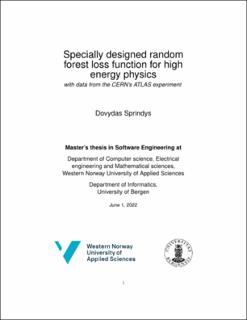| dc.contributor.author | Sprindys, Dovydas | |
| dc.date.accessioned | 2022-09-05T23:38:20Z | |
| dc.date.available | 2022-09-05T23:38:20Z | |
| dc.date.issued | 2022-06-01 | |
| dc.date.submitted | 2022-09-05T22:00:01Z | |
| dc.identifier.uri | https://hdl.handle.net/11250/3015858 | |
| dc.description.abstract | The purpose of the ATLAS experiment at CERN is to provide a better understand of the underlying principles of fundamental particles and to potentially discover new ones, such as dark matter. The process of doing so is long and difficult, requiring different types of expertise. One part of the process is to investigate the data recorded and determine whether deviations from known physics can be observed. In this thesis, different loss functions, including ones that are custom designed, will be applied to machine learning algorithms to assess whether they can improve the separation of data that has a potential to contain information about new particles versus the data that contains only known physics. A paper presenting the findings of this thesis is in a preparation with the intention of being published. | |
| dc.language.iso | eng | |
| dc.publisher | The University of Bergen | |
| dc.rights | Copyright the Author. All rights reserved | |
| dc.subject | Machine learning | |
| dc.subject | ATLAS | |
| dc.subject | CERN | |
| dc.title | Specially designed random forest loss function for high energy physics | |
| dc.type | Master thesis | |
| dc.date.updated | 2022-09-05T22:00:01Z | |
| dc.rights.holder | Copyright the Author. All rights reserved | |
| dc.description.degree | Master's Thesis in Joint Master's Programme in Software Engineering - collaboration with HVL | |
| dc.description.localcode | PROG399 | |
| dc.description.localcode | MAMN-PROG | |
| dc.subject.nus | 754199 | |
| fs.subjectcode | PROG399 | |
| fs.unitcode | 12-12-0 | |
